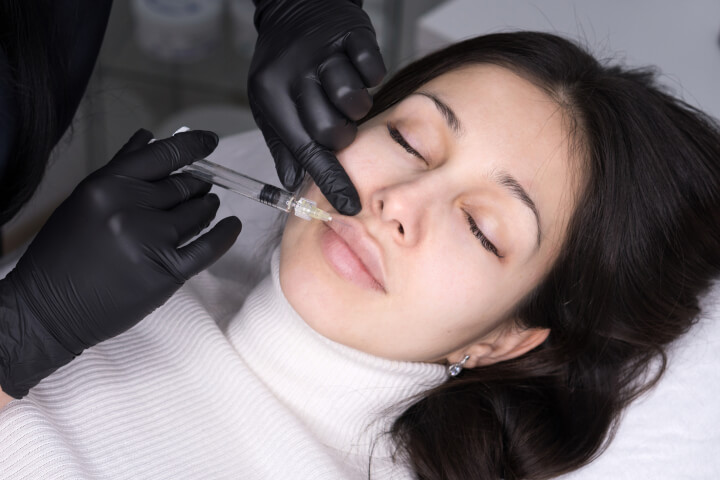Side Effects of Collagen Fillers

Collagen is the most prevalent protein in the skin. It can be found in bones, cartilage, skin, and tendons. This makes it a good ingredient in fillers to improve fullness and give the skin more volume. When collagen is correctly injected beneath the skin, it can restore its natural elasticity,, reduce the look of scars, and even make the lips look fuller and more supple. However, you should note that there might also be a few drawbacks that come with getting collagen fillers.
So do collagen fillers have side effects? Yes they have, and these include swelling, bruising, pain, itching at the injection site, and scarring. These shouldn’t be of major concern as these will resolve on their own, but there could be more severe or uncommon problems that could occur, especially if these treatments are done by untrained and inexperienced providers. It’s best to go to reputable and credible providers to get great results in a safe way.
Learn More: What’s The Best Filler for Deep Forehead Wrinkles?
What is your perfect cosmetic filler? Whether in your lips, cheeks, or anywhere else, our providers know exactly how to make you look your best. Call us today to learn more.
Side Effects and Complications
Facial collagen injections are a safe and effective method of achieving shapely lips and smoother, less wrinkled skin. Patients should be warned, however, that the treatment does have some risks and problems, such as allergic responses, uneven skin tone around the treatment region, and infection. Before getting collagen filler treatments, patients should be given a full disclosure of their dangers and advantages, just as they would with any other cosmetic procedure.
1) Swelling, Bruising, and Discomfort
As with any form of injection, swelling, bruising, or discomfort at the injection site is to be expected. These are usually mild and last for less than 7 days in the nasolabial folds and 14 to 18 days in the lips. Some studies have shown that swelling and bruising are more common in patients in their mid-thirties. If you fit this category, you shouldn’t worry too much.
2) Allergic Reactions
Collagen fillers are made from cow protein. They also include polymethyl methacrylate (PMMA) beads as well as lidocaine, a topical anesthetic, to assist make the treatment as comfortable as possible.
The main side effect of the filler is an allergic reaction to cow protein or lidocaine; thus, a prior skin sensitivity test is required.
3) Ruptured Blood Vessels
Some patients may have skin darkening, bruising, and discoloration. These occur as a result of blood vessel rupture during the injection. The lesions gradually died and, in some cases, remained as scarring or black patches.
4) Skin Peeling
When your skin doesn’t accept the newly supplied collagen, it begins to peel. This is similar to getting a sunburn and can be easily treated by a doctor.
5) Scarring and Marks
Another negative effect of collagen injections is the formation of lumps on the skin’s surface that mimic pimples. These lumps have the potential to rupture and leave scars or markings. They’re typically transient and can be treated by a doctor.
6) Uneven Skin
This side effect is caused by an insufficient amount of collagen in a single location. It could be obvious right away or take a few days. Always have any lumps that appear after injections examined by a doctor to rule out infection or other dangerous conditions.
How The Injection Method Works
The actual collagen injection method is rather simple. Treatment normally takes between 30 to 60 minutes and takes place in the doctor’s office. Doctors put collagen injections in locations that will optimize the eradication of wrinkles and facial lines based on each patient’s cosmetic needs. Patients frequently see considerable changes in their appearance within a few days, and any puffiness or bruising caused by treatment subsides.
What to Expect Before Treatment
Prior to collagen treatment, the patient undergoes a skin test to rule out any allergic reactions to the collagen material. The doctor injects a little amount of collagen into an inconspicuous area of the patient’s body, and the patient watches the area for roughly a week. Approximately 97% of patients had no adverse reaction. The type of collagen utilized during treatment will be determined by whether or not an allergic reaction occurs.
What to Expect During Treatment
Collagen treatment consists of one or more collagen injections into a specified location. Some people find injections slightly painful, particularly those administered on the lips or around the nose. To reduce pain, a topical anesthetic can be administered to the injection site. Some collagens contain a trace of lidocaine, which helps to numb the injection site. Most treatments are completed in less than an hour and can be completed over your lunch break.
What to Expect After Treatment
There may be some temporary bruising, puffiness, or discomfort around the injection site immediately following the treatment. This is typical and will go away in a few days. Patients can resume their normal daily activities practically immediately after therapy. The duration of collagen therapy can range from 6 weeks to 6 months, or more in some cases. The body will naturally absorb the collagen over time, necessitating further treatments to maintain the cosmetic boost.
To maintain benefits, most collagen treatments necessitate “touch up” injections 2 to 4 times a year.
Alternatives to Collagen Fillers
Given these negative effects and complications, it’s reasonable that many people would want to explore alternatives. Unfortunately, there’s no such thing as a miraculous skincare regimen or a single product that can completely replace or perfectly mimic the effect of filler.
Preventative skincare thankfully can make a major difference in the texture and future of your skin, especially if practiced in conjunction with good habits and a healthy lifestyle. A variety of cosmetic procedures, with varying degrees of efficacy, can battle the indications of age and face wrinkles. Some well-known examples are:
1) Lotions
Some lotions aid in the reduction of fine wrinkles by stimulating skin cell turnover. Others contain minor irritants that might cause regions of the skin (such as the lips) to swell and appear plumper for a short period of time.
2) Microdermabrasion
Microdermabrasion includes the use of a wand-like tool that sprays microscopic, abrasive particles to “sand” the top layer of skin, revealing the softer, smoother underlayer. The technique aids in skin tightening and wrinkle reduction.
3) Dermabrasion
Dermabrasion scrapes the top layer of the skin to reveal the newer, fresher, and healthier skin underneath. It makes the skin smoother and reduces the appearance of scars and wrinkles in turn.
4) Chemical Peels
Peels use chemicals to exfoliate the skin’s dead outer layer and reveal the newer, fresher underlayer.
5) Collagen Supplements
Collagen supplements and peptides have been shown in studies to help halt the aging process by enhancing skin elasticity and hydration.
According to research, taking a collagen supplement containing 2.5 grams of collagen daily for 8 weeks resulted in considerable results.
The most visible distinction between collagen supplements and injections is the speed with which results are obtained. Injections have instant benefits, however, collagen supplements take time to show results.
6) Injectable Fat
Microlipoinjection, also known as fat injection, is a technique for recycling the body’s own fat by extracting it from one location and injecting it into another. It’s frequently used to improve the appearance of aged skin, sunburns, and scars
Since a person’s own fat is used for the surgery, there are fewer allergy hazards than with collagen.
Read More: Which Areas of the Face Can Be Injected With Dermal Fillers?
The Best Collagen Filler Treatment at aNu Aesthetics

Collagen fillers are a long-term solution for younger-looking skin. They plump the lips, minimize wrinkles, and improve the appearance of scars. However, because of the risk of allergies, they have been replaced on the market with safer (although shorter-lasting) materials. When determining where to get collagen injections, choose a certified aesthetic practitioner who conducts the treatment on a regular basis.
At aNu Aesthetics, our in-house aestheticians and staff are highly-skilled and experienced in conducting collagen filler treatments. We are known for providing long-lasting results and giving quality services and care to all our patients. Get your collagen filler treatments in a safe and stress-free environment in the hands of the best practitioners in the area. Contact us today to schedule an appointment.
What is your perfect cosmetic filler? Whether in your lips, cheeks, or anywhere else, our providers know exactly how to make you look your best. Call us today to learn more.